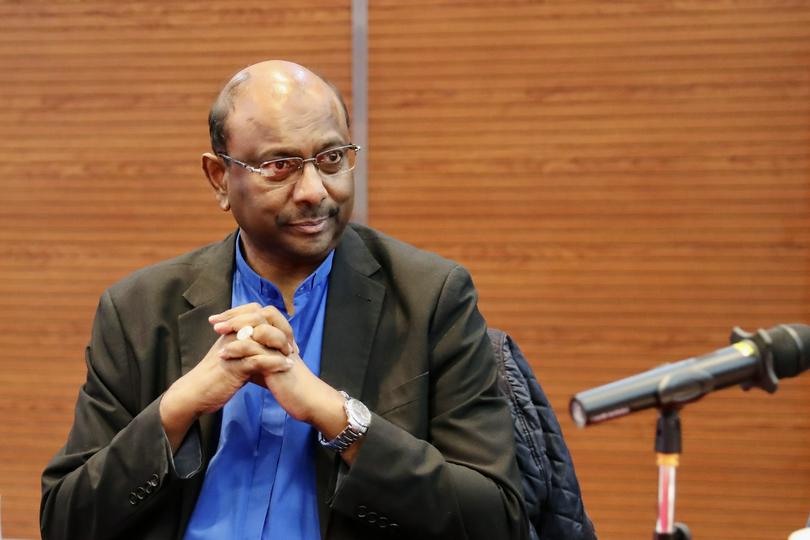The World Council of Churches (WCC) is a fellowship of 356 member churches from 360 different denominations from 120 countries in the world, representing over 600 million Christians. From November 20 to 26, WCC will convene its meeting of the executive committee, its governing body selected from the member churches in every region, with the theme of "Christ, culture, and context" in Hangzhou, Zhejiang Province, to monitor ongoing work, supervise the budget, and handle policy matters. On Thursday, the faith-based Amity Foundation will launch a special edition of the Bible to commemorate the Nicaea 1700th anniversary. The 25-person executive committee will also issue statements on public issues concerning the life and witness of the churches.
The China Christian Council (CCC), established in 1980 as a post-denominational church, is one of the WCC member churches and has a presence in the executive committee. Rev. Prof. Dr Jerry Pillay, WCC general secretary, talked with China Christian Daily about the meeting, his impressions of China, the Chinese context, and the Chinese church in relation to the global church.
China Christian Daily: What are the main topics on the agenda of the upcoming executive committee meeting in Hangzhou, and what outcomes do you hope for from this meeting?
Rev. Prof. Dr Jerry Pillay: Each day, we will learn something different: women's ministries, contextualizing Christianity in China, environmental issues in China, and state-church relationships in China.
One of the experiences of China is post-denominationalism: How do we understand that, and how can we learn from that?
With regard to Christians in China, where Christianity is not in the majority, how do you work and function as Christians? In many other places in the world, we have experiences where Christians are not in the majority, and they teach us a lot about how we can have better relationships, how we need to be more open-minded, and how we need to also draw the context into Christian practice and relevance.
I think one of the conversations that will be a necessary conversation is the issue of state-church relationships. The issue is not only a conversation in China but worldwide. We hope to learn from the Chinese experience about state-church relationships and how these things can be helpful or not helpful in the context of faith and Christian development.
China has a great sense of diversity with 56 ethnically different groups, owing to a rich history and an embedded civilization. We need to learn from that as well: How do all of those things speak to us in terms of the context? What about the theology? What are the theological experiences within the Chinese Christian experience? There will be many sessions that are structured.
There will be a cultural evening one night and visits to some specific sites. Many people from the executive committee will be in China for the first time and are looking forward to the beautiful country.
China Christian Daily: WCC has long maintained relationships with the church in China. How do you see the role of the Chinese church within the wider fellowship of the WCC today, and what can it contribute to the global church?
Rev. Prof. Dr Jerry Pillay: China is a country that has grown phenomenally in economy, technology, richness, and diversity, and impartation of that to the world. Christians in China are able to explore new developments in how China reaches out to the world and to be able to say what we contribute to the global Christian movement.
The China Christian Council (CCC) does it well because it is part of the WCC's governance structures. I'm pleased that the churches in China have direct access to sharing and contributing from the Chinese context, as CCC is a member of the central committee and of the executive committee as well. When we visit China in the coming days, we can explore in terms of communicating a strong message from the Chinese context.
China Christian Daily: Could you share a particular encounter or experience from your visit to China that left a deep impression on you?
Rev. Prof. Dr Jerry Pillay: I've been to China twice. I enjoyed the diversity of culture and people and their ability to work together in the Chinese context. I've appreciated the China Christian Council and their work and ministries in the context of living the Christian faith in China.
In my conversations with the church and the government, there was a clear indication that there is freedom of religion and that any religious groups, including Christians, will need to be registered to be recognized and to formally practice their faith. Another fact is that the state is supportive of the church and religions.
But some people have some questions about whether oversupport is also part of state control, which is a debate that one has to navigate outside of China. We also wish to explore getting more in-depth, clearer information and a better understanding of the Chinese context.
China Christian Daily: What are the major theological agendas facing the global church at present?
Rev. Prof. Dr Jerry Pillay: Our executive committee meeting will talk about the global context and the reflections. The global context is distressing at this point because we are seeing so many wars and conflicts, as well as factions taking place in different parts of the world.
Violence, which pervades the world, does not solve problems; dialogue does. We need to get people around the table to talk through the challenges and be able to find solutions together. It's good to know that in the Israel-Palestine context, this is happening now, and there's a ceasefire, although there are ongoing attacks and violence. But it also needs to happen in the Ukraine and Russia context, where lives are taken daily and nobody seems to find solutions, including political leaders who have more ability and authority. There's a terrible situation of military experiences in South Sudan, where people are being killed.
WCC has been involved in these contexts, and we still are. We also work in Colombia, where we've been invited to be part of the Total Peace Project (TPP) for almost three years. We will get reports from all of these particular global interventions on peacemaking, which we have been busy with over the past year.
WCC also focuses on climate, economic, gender, and digital justice issues. WCC launched a campaign for climate justice action in June this year at the central committee meeting. Migration justice is also one of the major issues, especially in Europe and even in the United States, and we will receive reports on our peacemaking activities.
We also hope to do a reflection on the context of China: "What does this context have to offer to us and speak to us as a global community?" and "What can we learn from that context?" We are open and looking forward to the conversations and dialogue that we will have within the context of China itself.
China Christian Daily: Coming from South Africa, a country deeply shaped by the history of racial reconciliation, has your experience influenced your understanding of visible unity within the global church?
Rev. Prof. Dr Jerry Pillay: Absolutely. We lived under oppression under the strong experience of racism, legislated by the law, in which non-white people were treated in a far inferior way in comparison to white people. It was a long struggle against apartheid, which shaped me in seeking reconciliation and peace. As general secretary of WCC, they've been born in that particular experience of the South African context, which has naturally equipped me to deal with a number of different issues around the globe, especially when it comes to issues of reconciliation, healing, unity, and peace.
China Christian Daily: Do you have any words for Christians in China?
Rev. Prof. Dr Jerry Pillay: Christians in China have much to offer. We need to seize the opportunity to be able to share our faith with the rest of the world. Use all the opportunities and facilities given to you to share your faith.
As a country, China is a serious global player. From that perspective, Christians in China need to ask, "How can we become a serious Christian global player in the contributions that we offer to the world?" WCC is one possible facility that can be made available to you to do that.
China is, by all means, a trendsetter in many ways. How do these things also have an impact in terms of making Chinese Christians become trendsetters in the global fellowship and global Christianity?
Be true to the gospel and proclaim your faith as you live in Jesus Christ as you work with others to create a better world, not only in China, but beyond China, in the global context at large.












